Plastic waste is everywhere — in our oceans, on our streets, and piling up in landfills. While recycling has become more common in recent years, much of the success of plastic recycling depends on one powerful, often overlooked piece of equipment: the plastic crusher machine. Also known as a plastic shredder or plastic granulator, this industrial tool has become a game-changer in the global fight against plastic pollution.
In this article, we’ll explore:
-
What a plastic crusher machine is
-
How it works
-
Key benefits and features
-
Types and applications
-
New trends in smart crushing technology
-
How to choose the right machine for your needs
Let’s dive in.
🔧 What Is a Plastic Crusher Machine?
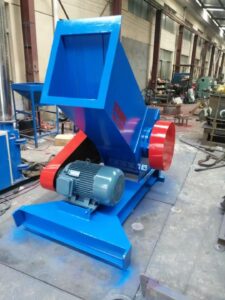
A plastic crusher machine is an industrial machine designed to break down plastic materials into smaller pieces — chips, flakes, or powder — for further processing or reuse. It serves as the first step in most plastic recycling lines.
These machines can handle various materials, including:
-
PE (polyethylene)
-
PP (polypropylene)
-
PVC (polyvinyl chloride)
-
PET (polyethylene terephthalate)
-
ABS, PS, and other engineering plastics
From plastic bottles and films to crates, pipes, and sheets — crushers make the material manageable and ready for the next steps: washing, drying, and pelletizing.
⚙️ How Does It Work?
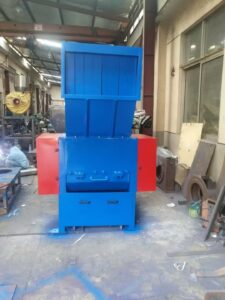
Plastic crushers operate on a rotating blade and fixed blade mechanism. The process is simple but powerful:
-
Feeding: Plastic waste is loaded through a hopper into the crushing chamber.
-
Cutting: Rotating blades driven by a motor cut and shear the plastic against stationary blades.
-
Screening: The crushed material is filtered through a mesh screen to ensure uniform particle size.
-
Discharge: The processed plastic falls out from the bottom for collection or further processing.
Most machines include overload protection, noise reduction features, and adjustable blade settings to accommodate different materials.
💡 Why It Matters: Key Benefits of Plastic Crusher Machines
Using a plastic crusher offers both economic and environmental benefits:
♻️ 1. Reduces Waste Volume
Crushing plastic dramatically reduces the volume of waste, making storage, transport, and recycling more efficient.
🏭 2. Increases Recycling Efficiency
Smaller plastic particles are easier to wash, dry, and reprocess, improving the quality and yield of recycled plastic pellets.
💰 3. Saves Cost
By reusing crushed plastic in-house, manufacturers reduce the need to buy virgin raw materials.
🌱 4. Eco-Friendly Impact
More efficient recycling means less plastic ends up in landfills or the environment, directly supporting sustainability goals.
🧠 Next-Gen Innovation: Smart Plastic Crushers
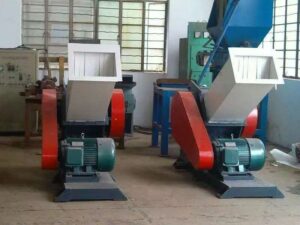
As demand for recycling grows, the market has seen the rise of smart, automated plastic crusher machines. These innovative machines feature:
-
Touchscreen control panels for easy operation
-
Variable speed control for different plastic types
-
AI-powered sorting and monitoring
-
Real-time diagnostics to detect blade wear and motor load
-
Low-energy modes to cut power usage by up to 30%
Some even come equipped with IoT connectivity, allowing you to monitor performance and maintenance schedules remotely via mobile app.
🛠️ Types of Plastic Crusher Machines
There are several types of crushers, each suited for different materials and production scales:
| Machine Type | Description | Ideal For |
|---|---|---|
| Standard Plastic Crusher | Basic crushing of bottles, containers, sheets | General recycling |
| Silent Crusher | Soundproof design for indoor or office use | Low-noise environments |
| Heavy-Duty Crusher | Thick blades and strong motor | Large pipes, crates, solid plastics |
| Flake Crusher | Designed to produce uniform flakes | PET bottle recycling lines |
| Pulverizer | Grinds plastic into fine powder | Rotomolding or compounding lines |
🏗️ Common Industries That Use Plastic Crushers
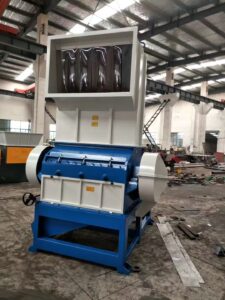
Plastic crusher machines are used in various industries, including:
-
Plastic product manufacturing
-
Packaging
-
Automotive
-
Construction
-
Agriculture
-
Municipal recycling centers
A plastic film manufacturer may crush edge trims for reuse. An injection molding factory can grind rejected parts to remold. Even farmers use crushers to recycle agricultural film.
🔍 Choosing the Right Plastic Crusher
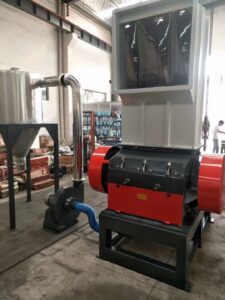
Not sure which machine suits your operation? Consider these factors:
-
Material type: Hard plastics (like ABS) require stronger blades than soft films (like LDPE).
-
Output size: Define your desired particle or flake size.
-
Capacity: Measured in kg/h or tons/day. Choose based on your expected workload.
-
Blade design: Choose between claw-type, flat-type, or V-type blades.
-
Power requirements: Ensure your site power matches the motor size (usually 5.5kW to 75kW).
-
Noise control: Go for silent models if noise is a concern.
A good supplier should provide customization options and after-sales service, including spare parts, installation guidance, and maintenance support.
🌐 Global Trends and Market Outlook
With rising environmental awareness and stricter plastic bans worldwide, the market for plastic crushers is booming. Innovations in biodegradable plastic recycling, multi-material crushers, and modular systems are already gaining traction.
Moreover, many governments are offering tax incentives and grants to companies investing in recycling equipment — making now the ideal time to upgrade or expand your system.
✅ Final Thoughts
The plastic crusher machine may not get as much attention as flashy recycling robots or biodegradable polymers — but it is the unsung hero of plastic waste management. Whether you’re a factory owner, recycling entrepreneur, or part of a sustainability team, investing in a quality plastic crusher is a smart, future-ready decision.
Want to learn more or see our machines in action?
📩 Contact us today for models, videos, and pricing. Let’s make plastic waste a resource, not a problem.
